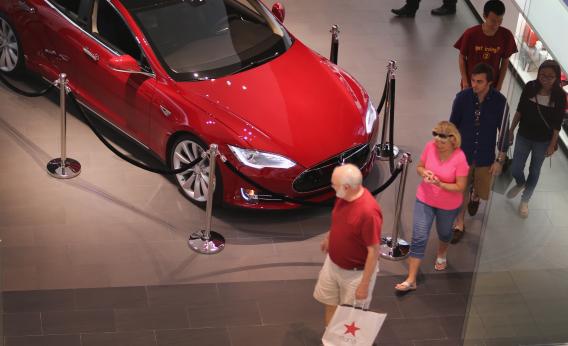Tesla somewhat unexpectedly earned a modest profit in the first quarter of this year, which naturally raised expectations for the following quarter. And in a letter to shareholders pegged to today’s earnings release (PDF), CEO Elon Musk claims victory: “While profits were still modest in absolute terms and not our primary mission, net income increased by 70% from last quarter, driven by record Model S deliveries and a significant improvement in automotive gross margin.”
Delve into the report, however, and this turns out to be not quite as simple as it seems. Publicly traded companies are obliged to report earnings in terms of what are known as Generally Accepted Accounting Principles (GAAP) and that 70 percent increase in based on a non-GAAP measure.
The use of non-GAAP measures in a young and growing company should by no means be necessarily seen as a red flag, but it is worth understanding what’s going on here. The basic issue is that Tesla’s cars are near-universally praised but also very expensive. So to help put people in cars, Tesla rolled out an innovative loan/purchase/buyback scheme that lets people basically lease the cars but with Tesla getting all the money up front via a financing arrangement with Wells Fargo or US Bank. GAAP rules, however, require Tesla to account for this like a lease with money coming in dribs and drabs over the course of the three-year term covered by the buyback guarantee. Measured in those GAAP terms, Tesla lost money.
Their preferred non-GAAP measure asks a bit more simplistically “did we add more money to the bank account by selling cars than we spent building cars?” and the answer is “yes.”
Non-GAAP account is sometimes very dodgy (see, e.g., Groupon) but in this case it seems entirely defensible to me. Tesla is obviously still a very small company at this point and its future doesn’t particularly hinge on Fiscal Year 2013 profitability. The important thing for the company is to keep building out its charging infrastructure, to get better at manufacturing its cars, and ultimately to produce something more affordable than the Model S. The message of their non-GAAP number is that they’re essentially on track. More people have Teslas than did a quarter ago, and Tesla has more money than it did a quarter ago. Whether you want to say that’s “really” profitable or not, the bottom line is that Tesla has the financial resources to continue ahead with its strategy and that’s what really counts.
